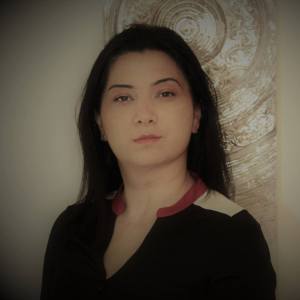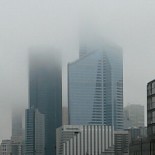In Paris, Syrian Revolutionary Women Get a Voice of Their Own
“Abandon all hope, ye who enter here”, reads an inscription standing at the gate of Hell in Dante’s epic poem Inferno. This dire warning would find a rightful place on a signpost at every checkpoint along the border of war-torn Syria.
After eight years of armed conflict, hundreds of thousands of people killed, injured, displaced or forced to seek asylum abroad, Bashar al-Assad is still in power, protected by his powerful allies in Iran and Russia. Little by little, they crushed the March 2011 revolution, leaving the Syrian people to face either Assad’s dictatorship or the violent, fanatical rule of Daesh, the so-called “Islamic State” – or, for those in the northernmost part of Syria, the authoritarian leadership of Rojava, a self-proclaimed “autonomous” Kurdish-led state-like entity.
Now the world is all but calling the conflict for Assad, like the announced U. S. withdrawal from Rojava won’t make any difference.
Not so fast. Even though the Free Syrian Army, the armed component of the March 2011 revolution, was defeated on the ground, the revolution lives on politically and intellectually, if only through the Syrian communities active abroad, not least in Paris where Syrian revolutionary activism endures.
Women’s revolution within the revolution
In September 2017, a Parisian Syrian revolutionary milieu already teeming with activity, from indoor public meetings to open-air festive fundraisers, knew a latest addition with the creation of a new association, devoted to a specific public who had seldom been heard until then within the ranks of the revolution – women.
Syrian Women’s Rebirth (Renaissance des Femmes Syriennes, RDFS) was created by Samira Mobaied, a researcher in environmental politics and the Paris representative of the U. S.-based revolutionary group Christian Syrians for Peace, as well as several other women scientists from Syria. “RDFS gathers researchers in human and social sciences, researchers in psychology, specialists in education, law, and economy”, explains Mobaied. “Our membership also includes educators and civil society activists.”

If intellectual strength won anyone a war, the Assad regime would have gone the way of dinosaurs a long time ago. The Syrian revolution has never been short of intellectual energy. Since 2011, Syrian writers throughout the world have published more books than had previously been published in the whole country. Why should a women’s association be an exception?
The one exception is in others’ minds, where women often stand out as revolutionary martyrs – be it Razan Zaitouneh, the lawyer and human rights defender abducted by an armed group in late 2013, or the late artists Fadwa Suleiman and May Scaff, both laid to rest in the Paris area. Even a revolution for democracy, progress and secularism, ultimately overrun by other groups advocating Jihadism, does not seem to find it obvious when women want to enter the stage and have their say independently.
“Within the Syrian revolution,” reveals Mobaied, “reactions to groups promoting the cause of women have always been divided. There are those opposed to addressing women as a specific group politically or socially, and those more positive people who believe that is a necessary form of action.”
Never deterred, RDFS’s fifteen active members – out of thirty members overall – carry on with their own revolution within the revolution, bringing a feminine voice into a debate which has been largely dominated by male-instilled ideas and values all along.
Women’s courage in war
International law gives women in armed conflict a right to speak out. Resolution 1325 (2000) of the United Nations Security Council reaffirms “the important role of women in the prevention and resolution of conflicts and in peace-building,” also “stressing the importance of their equal participation and full involvement in all efforts for the maintenance and promotion of peace and security, and the need to increase their role in decision-making with regard to conflict prevention and resolution”.
RDFS does more than that. The group really puts a face on a concept many would deem an oxymoron – women’s courage in war. The kind of courage that needs no weapons to be victorious.

Samira Moubayed
In Mobaied’s own terms, “The actions of RDFS rotate around two axes: One social, the other political. Socially, we hold surgeries for Syrian women and organize socio-cultural events to make them come together, such as speech groups with Syrian women psychologists. Politically, through our public talks entitled “And now, Syrian women have the floor”, we strive to carry the voice of Syrian women, both into Syria proper and throughout the diaspora, as well as through existing campaigns of public outreach to draw attention to the Syrian cause”.
A cause to which French civil society’s response has not always been all it should be. Many citizens’ groups and political parties have shown unrestrained fascination for Rojava and its armed units that fought off Daesh in late 2017, thus turning a blind eye to the authoritarian and discriminatory ways of the Democratic Union Party (Partiya Yekîtiya Demokrat, PYD) which runs the self-styled autonomous zone. Not even that could hold RDFS back.
“Since September 2017,” recounts Mobaied with pride, “RDFS has worked with tens of groups in France, most of them women’s groups and other human rights organizations, as well as language support groups and associations specializing in mental health. All of them have shown great interest in RDFS whose membership reflects the variety of communities making up mosaic Syria.”
But, continues Mobaied, interest goes beyond mere curiosity. “These groups have shown real interest also in our actions, not led by ideology but aiming to help Syrian women. We come from a country that has been a dictatorship for more than fifty years, we want to help Syrian women stand on their feet and improve their condition, for RDFS strives to support women while respecting each woman’s own identity as a human being.”
Alone against all – but united in sisterhood
The PYD has been showing off its female fighters with their hair uncovered, giving Daesh hell like the terrorist organization gave hell to the populations it once conquered and enslaved. RDFS shows women’s rights need no theatrical effects – just the kind of courage that only women can show in war.
When living means having to choose between two types of domination – military or religious, unless the two walk hand in hand like in Daesh’s fading “caliphate”, when proposing a line of thought that escapes the traditional male paradigms that have shaped the region for centuries, courage is not a luxury.
“In the Syrian revolution, the voice of women gets silenced by both militarism and religious oppression”, admits a bitter Mobaied. “Our voice is constantly instrumentalized, in an ideological conflict where every party seeks to spread its model by putting forward its own vision for women.” Even Daesh claims to offer women a second chance, ironically by denying them any chance for emancipation in society. But Syrian women need and deserve better than that.
“Confronting the threat of military and ideological conflict, RDFS embodies a certain form of resistance led by Syrian women, fighting to defend the rights of Syrian women and support their quest for freedom and dignity. We also want to strengthen the independent political presence of women, completely apart from the many poles that dominate the Syrian scene.”

Unsurprisingly, the most dangerous of these poles when it comes to women is the Syrian regime itself, the Syrian state led by Bashar al-Assad. Since 2012, when Jihadi groups first appeared in the Syrian conflict, some Assad supporters have sought to justify the dynastic dictatorship by hailing the regime’s alleged promotion of women’s rights, as opposed to the reactionary views championed by Jihadi fighters. As Mobaied stresses, when it comes to that kind of cheap propaganda, buyer beware.
“Let’s set the record straight. The Assad regime is one of the world’s worst opponents to women and their human rights, their citizenship, their freedom.
The regime is based on permanent militarization, relying primarily on military predominance and state domination, in other words, on male domination. Such values obviously contribute to create the conditions, standards, and patterns encouraging violence against women.
In the regime’s prisons, rape is commonplace as one of the state’s tools for torture and terror.
The Assad regime has banned all civil society activity outside its Ba’ath party. Since the late 1960s, women’s movements have been completely controlled by the Ba’ath. Feminist and other social groups, trade unions, all of them were disbanded and replaced with the General Union of Syrian Women vowing to promote the Ba’ath ideology, never concerned with protecting women’s rights.
Paradoxically, the Assad regime that claims to be the custodian of secularism created and backed the Qubaysiat Sisterhood – an Islamic fundamentalist group and a tool to manipulate and dominate women in society.
As for the PYD, the Syrian branch of the Turkish PKK, it does have the Assad regime’s back. The PKK, a Marxist-Leninist organization, instrumentalizes women and the feminist cause to disseminate its ideology.”
It looks like Syrian women are alone against all, literally. But they are no longer alone as individuals, “Separated from (their) sisters” as the French Hymne des Femmes (Women’s Anthem) goes. Now RDFS is there to unite them in sisterhood.





Recent Comments